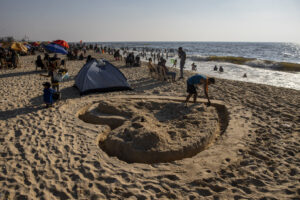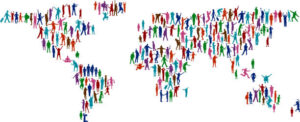“The greater part of our happiness or misery depends upon our dispositions, and not upon our circumstances.” ―
And yet in places like Gaza and Ukraine and the Sudan it’s impossible to believe that anyone could find happiness in such harsh, brutal and terrifying circumstances.
But miraculously, people do.
And it is one of the great miracles of life.
We see it in war torn areas across the globe everyday: men, women and children finding happiness while living ever more uncertain lives in an ever more diminished environment.
When I compare the hardships of my life with theirs I’m stunned and humiliated.
The minimum demands I make on life to keep me happy — are wildly out proportion to what I can rightfully claim as my share.
Last time I counted I’m but one member of the human family.
I remember a powerful lesson I was given on happiness.
It was years ago when Erin and I were watching a documentary on the war in Darfur.
A father shared how his village had been attacked and burned to the ground by forces of the Sudanese government.
During the assault his wife and daughter were raped and murdered in front of them. The father and son were later tortured and left for dead.
Somehow they survived and found their way to a refugee camp where, for three years, they existed on cornmeal, water and the loving encouragement of each other. It was hard to imagine how they made it through one day, let alone three years.
Yet this father and his son were very much alive.

This startling interview revealed how they’d moved beyond, way beyond, the devastation they had experienced and into a deeply uncertain existence that was far from over.
They shared their hopes and dreams for life after the camp and their conviction that they’d live to see that day.
What amazed me was their positive and hopeful attitude in circumstances that warranted no such optimism. Anyone watching the interview had to be deeply touched by the love and devotion of this father and son.
I remember wondering to myself:
- Where was the bitterness?
- Where was the resentment?
- Where was the outrage?
Why weren’t they screaming for revenge?
When asked this question the father raised both his hands and simply said,
“To what end?”
- Would it bring my wife back?
- Would it bring my daughter back?
- Would my village be saved?
Somehow, they had found a way to let go and move on from their misery. They had found a place deep inside where all the horror, sadness, and unfairness of life could not touch them.
I wondered how on earth they had done this.
One thing was clear: they didn’t find it through what they possessed, because they possessed nothing.
This father and son demonstrated life is best held with a light touch and an open hand.
In the fall of 1917 a teenager wrote to the Chicago Herald with the question, “What is happiness?” This is the response she received:
Happiness is always a by-product. It never comes to those who concentrate on securing it… It always comes as a result of something else. The pursuit of noble things, the things essentially worthwhile… As a man goes on life’s journey, with a brave heart, doing the best he can… he often hears the faint flutter of invisible wings, he feels a presence, a companion. It is Happiness.
So it was with the young boy and his father. They experienced the flutter of invisible wings.
The interview ended with the boy from Darfur offering the correspondent a bracelet made from rocks he’d found about the camp.
Every time the correspondent heard the sound of his bracelet he knew he was listening to — the flutter of happiness.
Just a thought…
Pat
Copyright © 2024 Patrick J. Moriarty. All Rights Reserved.




